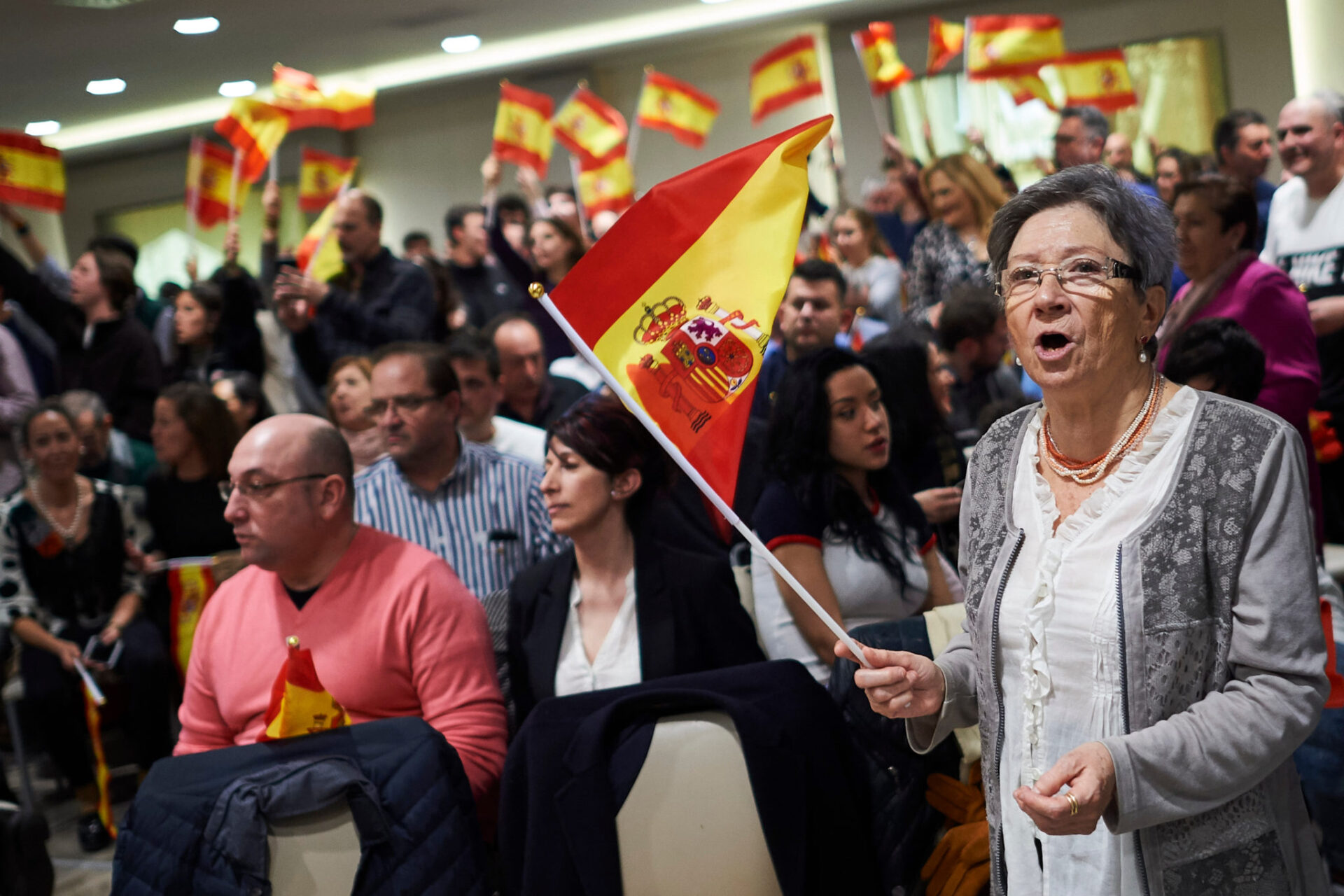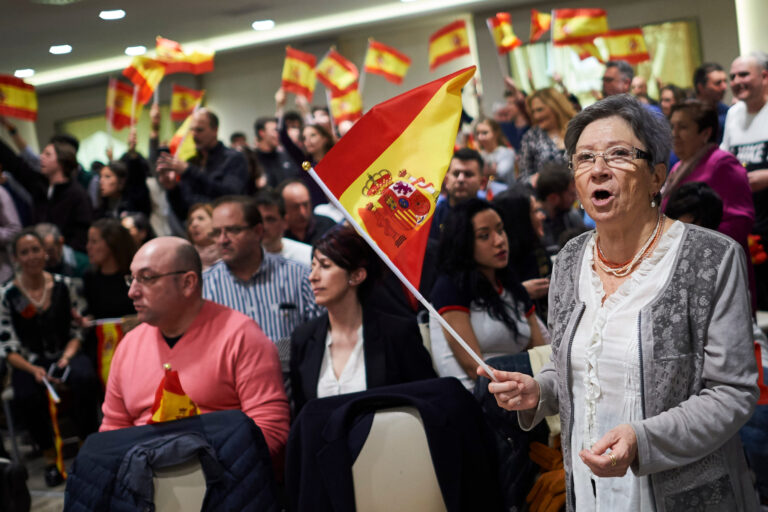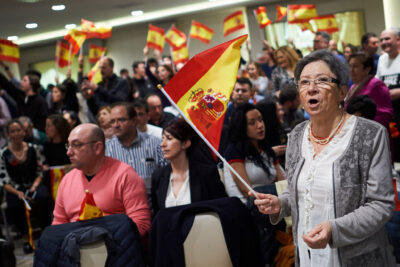The ultra-nationalist party Vox is a new player in Spain — it calls for walls to be built around the Spanish enclaves in North Africa, wants to throw Catalan leaders to prison, fights sexual minorities and demands free access to weapons. They want to “make Spain great again.” The election in Spain is already on Sunday, 28 April.
The ultra-conservative organisation CitizenGo was founded in 2013, at the same time as Vox. Set up as a platform for online campaigns, it operates around the world. It supports the so-called family values, fights abortion and LGBT rights. It has a branch in Poland, not registered in the Polish National Court Register. Financial statements of the Polish branch of CitizenGo look as if they were drawn by a secondary school pupil: coloured graphs take up two A4 pages. They suggest that CitizenGo deals in millions. Where does the money come from? Does CitizenGo pay taxes in Poland? There is no way to find out from the organisation’s website.
Its activists in Poland included Magdalena Korzekwa-Kaliszuk, known for her anti-abortion actions (she left the organisation couple of months ago) and Paweł Woliński, a former activist of an anti-abortion foundation Fundacja Mamy i Taty. In an interview for a Catholic portal Mały Dziennik, Korzekwa-Kaliszuk declared: “CitizenGO was founded to connect people around the world and make a change together. Petitions are only a tool for us to join our forces and defend good values together.”
Ignacio Arsuaga, the leader of CitizenGo says his organisation registers its donors with the Spanish Ministry of the Interior. Who are the sponsors? Arsuaga claims he cannot reveal that information under personal data protection regulations. “All donations are legal, and we have always used our resources for legal and public purposes” says Arsuaga.
Ignacio Arsuaga intensely supports the Vox party on Twitter. CitizenGo’s partner organisation in Spain, HazteOir (it has recently lost its status as a charitable organisation after violent campaigns against LGBT persons) calls Vox “the party that defends life, family and freedom the most”.
A journalistic investigation by the team of Open Democracy, who published a story on this on 26 April, shows that both groups (CitizenGo and HazteOir) have close links to Vox. Pretending to be a potential sponsor, an Open Democracy reporter met with Ignacio Arsuaga. Arsuaga openly described how the pro-abortion organisation is indirectly supporting the Vox party.
In Spain, the law provides for a limit of 50,000 euros for individual contributions to a political party. The limit drops to 10,000 euros after the start of an election campaign, and the names of donors must be reported to officials. You cannot donate more, and you cannot do it anonymously.
But Arsuaga explains that the restrictions do not apply to groups such as CitizenGo. A donor can remain anonymous. What happens next? CitizenGo will not be a direct channel for transferring money to Vox, but it is possible to transfer funds through another organisation. To put it bluntly: illegally finance Vox’s campaign with money that will flow through CitizenGo. “We talk to politicians, we campaign for policies, but we cannot act as party sponsors” explains Arsuaga.
Arsuaga revealed that CitizenGo intends to join in the campaign before the general election in Spain: “We will never ask people to vote for Vox. But our campaign will help Vox indirectly.”
Arsuaga is fascinated by the Vox party. Also by the fact that the party’s Secretary General, Javier Ortega Smith “descends from the far right, such as Franco’s Falange movement – but nobody knows that, it’s a sort of a private secret.”
A Vox activist with whom Arsuaga put the Open Democracy reporter in touch confirmed that supporting CitizenGo can help the party “indirectly”. He described CitizenGo as an independent organisation with which “we are actually in complete agreement”.
Asked by Open Democracy for a comment before publication, Arsuaga said: “It is obvious that supporting HazteOir.org or CitizenGO means indirect support for entities which, in some way, defend the principles that we defend.”
He confirmed that his organisations are in contact with social and political movements in Spain. And that they organise “campaigns to condemn those who violate those rules.”
CitizenGo has a few powerful international sponsors and partners — they include Alexey Komov, a close associate of a Russian oligarch Konstantin Malofeev, and Luca Volonte, an Italian politician currently being tried for corruption in Milan. They both sit on CitizenGo’s Board of Trustees.
Another Member of the Board is Brian Brown, an American activist fighting with LGBT, who heads the World Congress of Families (WCF) network. Recently, Brown met with Deputy Prime Minister Matteo Salvini from the far-right party Lega in Italy.
According to Open Democracy reporters, Patrick Slim, the son of a Mexican oligarch Carlos Slim is one of the sponsors of CitizenGo or HazteOir. According to Arsuaga, he has allegedly paid 40,000 euros to the anti-abortionists.
Bank statements of Volonte’s Novae Terrae Foundation in Italy, on the other hand, show that in 2014 the Foundation paid 12,000 euros to CitizenGo – exactly at the time when it was receiving money from organisations later identified as members of the “Russian Laundromat”, pumping illegal cash from Azerbaijan and Russia into Europe. There is no evidence that the money paid to CitizenGo came from these illegal sources.
Arsuaga revealed that, right from the start, CitizenGo has been supported by Darian Rafie, a senior staff member of the American conservative group ActRight. Rafie continues to advise CitizenGo. On its website, ActRight encourages Americans to “thank President Trump for stopping the transgender insanity in the military”.
Rafie is an experienced political consultant in the United States. He is associated with a number of companies that have worked for the Republican National Committee and the Republican Party in Ohio and Michigan, and he has worked for a conservative media agency from Texas which was briefly a subcontractor for Trump’s campaign. The same company has also worked with UKIP in the UK. Darian Rafie admits that in Trump’s presidential campaign he was involved in influencing voters through social media.
At the end of March, during the World Congress of Families in Verona, CitizenGo called on ultra-conservatives to look for an indirect way of rising to power. One of the organisers of the congress in Verona were people associated with the neo-fascist party Forza Nuova.
Arsuaga claims that CitizenGo has contacts with Fidesz in Hungary and Lega in Italy, as well as AfD in Germany. Does he discuss their campaign strategies with these parties? Arsuaga says he does. When asked to comment on their relationships with CitizenGo, Lega, AfD and Fidesz did not respond.
Nasz Dziennik, a newspaper owned by Father Tadeusz Rydzyk’s media empire, and CitizenGo have been running a website zapolske.pl for the past several years, where you can pray for selected politicians. Another website opusangelorum.pl is registered on the same server. This one, on the other hand, calls for prayers for the angels. Donations to support the website can be made to a bank account registered in Austrian Tirol.
In late March, the leader of the Spanish party Vox, Santiago Abascal, was met by Jarosław Kaczyński in Poland. They talked about a possible coalition after the European parliamentary election.
Co-founder and editor-in-chief at FRONTSTORY.PL, Wojciech Cieśla is an award-winning Polish journalist who, since 2016, has worked with Investigate Europe. He is the co-founder and chairman of Fundacja Reporterów (Reporters Foundation). He is based in Warsaw.







